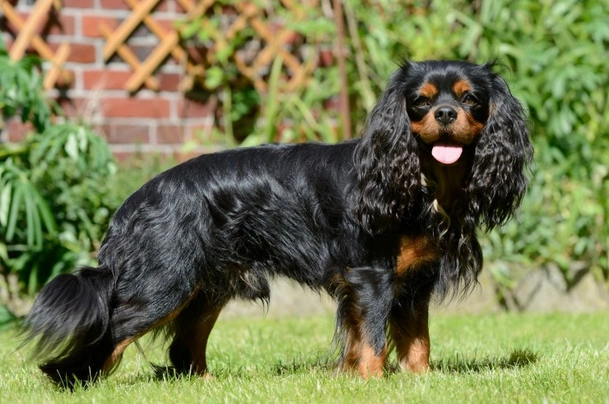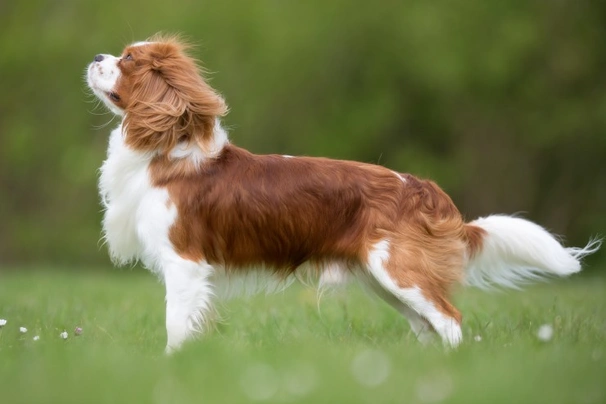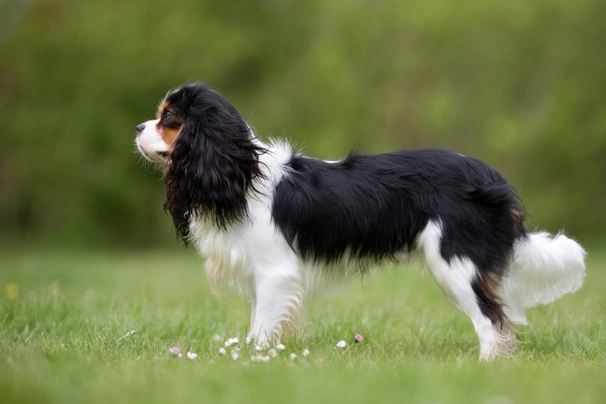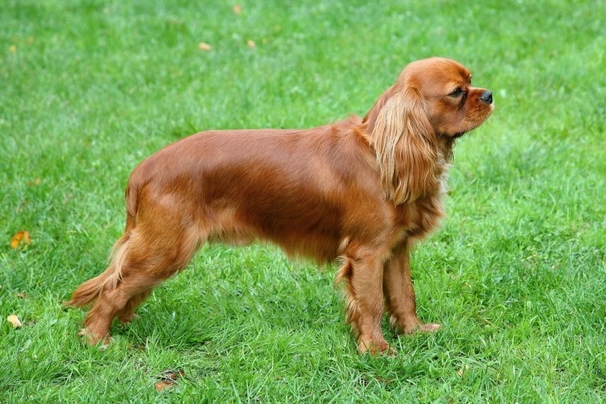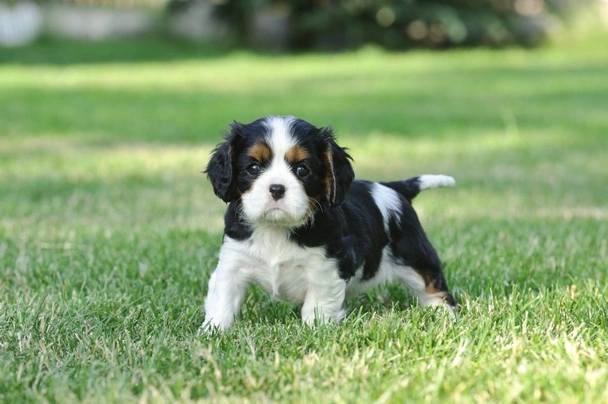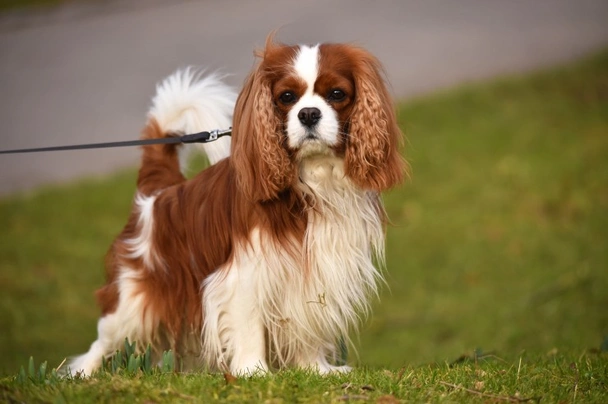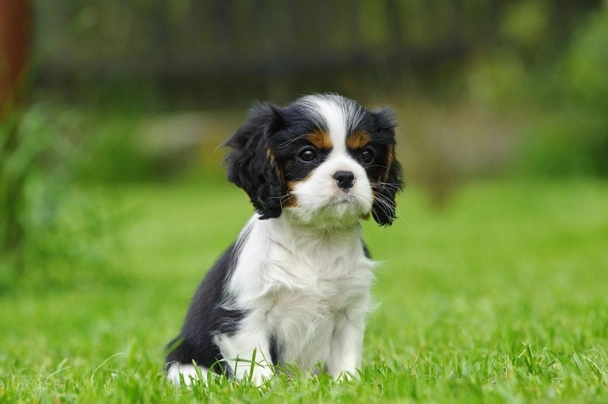Cavalier King Charles Spaniel
Pros
Cons
Introduction of the Cavalier King Charles Spaniel
The Cavalier King Charles Spaniel is among one of the oldest toy breeds boasting an illustrious history that can be traced back several centuries. The Kennel Club only recognised the Cavalier as a unique breed in 1944 and by the seventies they were to become one of the most popular dogs in the UK. Cavaliers are larger than their King Charles cousins and they boast a longer less snubbed nose too.
Cavaliers are known to be easy-going dogs that easily adapt to many lifestyles whether it's living in a country environment or in an apartment in town. They are also known to be very good around children of all ages and become valued members of a family. They are also incredibly loyal and devoted companions never too demanding. In general the Cavalier King Charles Spaniel is unlikely to show any aggression towards people or other animals because of the ultra-kind and laid-back natures which is why they have consistently remained one of the most popular breeds not only in the UK but elsewhere in the world too.
History of the Cavalier King Charles Spaniel
The breed's history is a bit hazy but what is known is that Cavalier King Charles Spaniels have been around for a very long time. There is some evidence of the breed originating in the Far East and Japan. The breed may also share their ancestry with other breeds from that region of the world namely the Japanese Chin and the Pekingese.
The Cavaliers we see today are directly descended from the small Toy Spaniels depicted in 16th 17th and 18th Century masterpieces when it was customary for European royalty to be offered toy spaniels as gifts to ladies in Court during the Tudor period which they carried around to keep their hands warm. It was not until the Stuarts were on the throne that these spaniels were given their "Royal" title of King Charles Spaniels because the King would rarely go anywhere without his favourite dogs in tow. There are some people believe toy spaniels were crossed with pugs to produce a smaller face more pronounced eyes and domed heads in the breed although because no records were kept their breeding was a little hit and miss.
The earliest record of a toy spaniel in the UK is in a painting of Queen Mary 1 and King Philip. They were a particular favourite of well-bred ladies in Tudor times and valued as 'comforters' which saw these little dogs usually sitting on a lady’s lap during carriage journeys which is when they really did need their hands keeping warm.
The breed fell out of favour for a while but regained their popularity during Queen Victoria's reign and has remained one of the most popular breeds right up till modern times. It was during the reign of Queen Victoria that dog shows started to be held and when enthusiasts began showing an interest in setting a standard for the Cavalier King Charles Spaniel with an end goal being to produce a more desirable dog. The result being a spaniel with a shorter face which eventually became the flat face domed head and longer ears.
An American called Roswell Eldridge who was a true enthusiast of Toy Spaniels set about encouraging UK breeders to produce dogs with "longer faces flatter skulls with a spot in the centre" but his wishes were only followed by a few breeders one of which was Mrs. Hewitt Pitt but because the numbers of longer faced dogs were so few they were not given recognition by the Kennel Club at the time. It was not until 1928 that the first Cavalier King Charles Spaniel Club was founded with a little spaniel called Anne's Son being used to set a breed standard which remains much the same as the breed profile of today. The standard was based on images of the spaniels that were around during the 16th 17th and 18th Century.
It was not until 1945 that the Kennel Club finally granted the Cavalier King Charles Spaniel recognition as a separate breed and by the sixties the number of dogs registered grew to four figures with 60 Cavaliers having been crowned Champion Dogs. In 1963 the first of the breed won the Toy Group at Crufts and ten years later another Cavalier was awarded Supreme Best in Show at Crufts bringing the breed into the limelight not only in the UK but elsewhere in the world too which included countries like Australia New Zealand America Finland and Sweden to name but a few.
By the late 1970's Cavalier King Charles Spaniels were becoming more and more popular at shows with dogs becoming Champions at many events with numbers reaching 10000 by the early eighties. During the 1990's Cavaliers often won top prizes in the Toy Group and these charming dogs continue to make their mark both at shows where they continue to be crowd and judge pleasers and the home thanks to their sweet natures and loving loyal personalities.
Interesting facts about the breed
- Is the Cavalier King Charles Spaniel a vulnerable breed? No they are among one of the most popular dogs in the UK
- Many royals including Queen Victoria was a huge fan of the breed
- They are considered as being the perfect “lap dog” and were once thought of as “comforters”
- They were names after King Charles II
- Many film stars and celebrities owned Cavalier King Charles Spaniels including Lauren Bacall
Appearance of the Cavalier King Charles Spaniel
Height at the withers: Males 30 - 33 cm Females 30 - 33 cm
Average Weight: Males 5.9 - 8.2 kg Females 5.9 - 8.2 kg
Larger than their King Charles cousins the Cavalier also boasts a longer less snubbed nose. The one thing about these dogs are their beautiful large and gentle eyes which are a true indication of their sweet natures. A Cavalier's head is nicely proportioned in relation to their body with a shallow stop and almost flat skull. Their muzzles are tapered with well-developed black nostrils. Their ears are set high on their heads and are long with lots of feathering. A Cavalier's jaw is strong with a perfect bite.
They hold their necks slightly arched leading down to a well-proportioned chest with strong shoulders and straight front legs. Cavaliers boast compact bodies with level backs and well-formed hindquarters. Their feet are well-cushioned feathered and compact. Their tails are well proportioned in length in relation to their bodies which they carry quite high although never too high.
Cavalier King Charles Spaniels boast lovely coats that comprise of silky long and straight fur that is curl-free. They have a tremendous amount of feathering and their coats should never be trimmed. They come in a variety of colours which are acceptable and recognised by the Kennel Club colours which are as follows:
- Black and tan - raven black with tan markings above a dog's eyes on their cheeks inside their ears on their chest and legs as well as underneath a dog's tail
- Ruby - a rich red colour
- Blenheim - evenly spread chestnut markings on a white coat
- Tricolour - black and white with tan markings over a dog's eyes on their cheeks on the inside of their ears on the inside of their legs and underneath their tails
Cavaliers boast beautiful markings which typically includes some dogs having a characteristic spot on their foreheads a very distinct trait that people find very endearing.
Gait/movement
The Cavalier King Charles Spaniel has a very elegant gait with a lot of drive coming from their hindquarters. When they move they do so freely with their front and back legs moving in parallel when seen from either the front or from behind.
Faults
The Kennel Club frowns on any exaggeration or departure from the breed standard with the seriousness of any fault being judged on how much it impacts a dog's health and well-being and how it would prevent a dog from carrying out any traditional work they were bred to do.
Male Cavaliers should have both testicles fully descended in their scrotums.
It is also worth noting that dogs may be slightly smaller or bigger they could weigh a little less or more than stated in the Kennel Club breed standard which is set out as a guideline only.
Temperament of the Cavalier King Charles Spaniel
Cavalier King Charles Spaniels have very sweet natures. They are undemanding little dogs that adapt well to all lifestyles with little fuss at all. They are extremely loyal and affectionate by nature as well as being playful which are just some of the reasons why the breed has been so popular not only here in the UK but elsewhere in the world too for such a long time. Other reasons include the fact that Cavaliers are so gentle by nature and would never show any sort of aggression to people or other animals they may meet.
They are intelligent dogs without the keen prey drive of other spaniels. Although slightly harder to train some Cavaliers excel in canine activities which includes agility. They are among one of the favourite breeds at shows always finding a place on the rostrum.
Cavaliers love to romp around in a garden and go out for a sedate walk but they are just as happy to cuddle up on a sofa with their owner when they can which makes them the perfect choice of "lap dog" something they excelled at in the 16th and 17th centuries when they kept the hands of noble ladies warm when they travelled in carriages. Cavaliers thrive on being around people and are never happy when they find themselves left on their own. As such they are best suited to households where at least one person stays at home when everyone else is out so they generally always have company around.
Are they a good choice for first time owners?
Cavaliers are a good choice for first time dog owners because they are renowned for being so loyal affectionate and eager to please. They thrive on being in a home environment and will happily snuggle up to their owners whenever they can. Because they are so amenable and intelligent Cavs are generally easy to train which includes housetraining.
What about prey drive?
Cavaliers unlike many other spaniels do not have a high prey drive and are generally good around other dogs smaller animals and pets because they are so social and non-aggressive by nature.
What about playfulness?
Cavaliers are fun-loving playful dogs by nature and love to not only be entertained but to entertain the people they love too. Because they are so intelligent they quickly know what pleases an owner and being fast when it comes to learning new things they excel at all sorts of canine sports which includes agility and obedience thoroughly enjoying all the attention they get when they are being trained and when they are competing at events or shows.
What about adaptability?
Cavaliers are extremely adaptable being just as happy living in town as they are living in the country providing they are given lots of attention exercise and mental stimulation that is with emphasis being placed on being given enough daily exercise to prevent a dog from putting on too much weight which they are known to do.
What about excessive barking?
Cavaliers are not known to be excessive barkers more especially if they have been well socialised from a young age which would involve them meeting lots of new people dogs and other animals. But with this said they are so social by nature that they tend to get on with everyone and everything although they would always let an owner know when there is someone at the door.
Do Cavalier King Charles Spaniels Like Water?
Some Cavaliers like water whereas others do not and are not particularly fond of getting their feet wet. Anyone sharing a home with a Cav that loves jumping in water whenever they can should take great care when walking their dogs off their leads anywhere near more dangerous watercourses just in case they decide to leap in.
Are Cavalier King Charles Spaniels good watchdogs?
Cavs do not make good watchdogs because they love everyone they meet. With this said a Cavalier would be quick to let an owner know if something they don't like is going on in their environment or when the doorbell rings because they would be excited at meeting the person at the door rather than wanting to scare them.
Intelligence / Trainability of the Cavalier King Charles Spaniel
Cavaliers are undemanding and extremely affectionate dogs which makes them easier to train than many other spaniels and dogs in general. They are always keen and eager to please and learn new things. As previously mentioned these little dogs do very well when they take part in obedience and agility trials which is proof of how easy they are to train when they are given the right guidance. However some Cavs decide to go so far before throwing in the towel which makes them all the more endearing to have around. With this said like other intelligent and amenable dogs the Cavalier's education must start early and they need to be well socialised from a young age so they grow up to be more outgoing confident adult dogs no matter what situation they find themselves in.
Cavalier puppies should be taught the ground rules right from the word go which can be hard given they are so cute but it would be a mistake not set limits and boundaries because like all dogs if a Cav knows what an owner expects of them the happier and more settled they tend to be when they first arrive in their new homes. The first commands a Cav puppy should be taught are as follows:
- Come
- Sit
- Quiet
- Heel
- Stay
- Bed
Children and other
The Cavalier King Charles Spaniel is known to be ultra-good and even-tempered when they are around children of all ages and if they have been well socialised as puppies they are generally very good around other pets and animals too thanks to their placid and social personalities. They are incredibly sweet natured and known to be undemanding tolerant characters in all sorts of situations which is why the breed has been consistently one of the most popular choices as family pets.
As with all breeds Cavaliers should be well socialised from a young age and introduced to lots of different situations people and animals as early as possible for them to become confident well-rounded adult dogs. With this said any introductions to new animals needs to be done slowly and carefully so that things go as smoothly as possible just to be on the safe side.
Health of the Cavalier King Charles Spaniel
The average life expectancy of a Cavalier King Charles Spaniel is between 10 and 16 years when properly cared for and fed an appropriate good quality diet to suit their ages.
The Cavalier King Charles Spaniel is known to be a healthy dog but unfortunately the breed is known to have a history of heart problems. The good news is that Cavs can now be screened before being used in a breeding programme and all responsible breeders would follow the recommendations as stated by the Kennel Club to ensure any puppies they produce are as healthy as they can be. The main health concerns associated with Cavaliers are as follows:
- Mitral Valve Disease (MVD)
- Syringomyelia (SM) - diagnosis can be established through an MRI scan
- Eye disorders which includes Hereditary Cataracts (HC) and Multifocal Retinal Dysplasia (MRD) - Breeders should have stud dogs tested
Another big health issue often seen in the breed involves their weight. Obesity can seriously impact a dog's life span shortening it considerably. Carrying too much weight can also lead to a dog developing all sorts of other health issues which includes heart disease.
What about vaccinations?
There have been quite a few reports about Cavaliers experiencing a reaction to certain vaccinations and more especially the Lepto vaccine. As such any owners having any concerns about having their Cavs vaccinated against Lepto should discuss things with a vet before making a final decision on whether to go ahead or not.
All puppies would have been given their first vaccinations before being sold but it is the new owners responsibility to have any future vaccinations done. The vaccination schedule for puppies is as follows:
- 10 -12 weeks old bearing in mind that a puppy would not have full protection straight away but would be fully protected 2 weeks after they have had their second vaccination
What about spaying and neutering?
A female Cav can be safely spayed when they are 6 months old. A male can be neutered when they are 6 months old too.
What about obesity problems?
As previously touched upon one of the biggest health concerns seen in Cavs over recent years involves their weight with far too many dogs now being reported by many vets in the country as being obese. Some Cavs do put on weight after they have been spayed or neutered so it's important to keep an eye on a dog's waistline and to adjust their calorie intake as well as their daily exercise accordingly. With this said Cavs all too easily will turn into couch potatoes which is when the real problems with their weight can start and why it is so important to feed a dog correctly and for them to be given enough daily exercise. Obesity can shorten a Cav's life by several years and puts a lot of pressure on their joints and internal organs including their hearts.
What about allergies?
Some Cavs develop skin allergies which can prove hard to clear up and why it is so important for a dog to see a vet as early as possible when things flare up. There are several things that can trigger an allergic reaction one of which is environment. Other triggers could include the following:
- Seasonal pollen/grasses
- Chemical commonly found in many household cleaning products
- Dust mites
- Fleas and ticks
- Food and more especially cereals which are found in many commercially produced dog foods
- Auto-immune skin disorders
Participating in health schemes
Today it is mandatory for all Kennel Club Assured Breeders to have stud dogs tested using the following schemes:
- Eye testing
- The Kennel Club also strongly recommends that all breeders should test their stud dogs through the following schemes:
- Breed Club - Heart testing (mitral valve dysplasia)
- BVA/KC CMSM Scheme
- DNA test - Episodic Falling
- DNA test - CC/DE
What about breed specific breeding restrictions?
It has now been genetically proven that 2 Blenheim Cavs would only produce blenheim puppies which is why only blenheim puppies that have been produced by 2 blenheim parent dogs would be eligible for registration with the Kennel Club. It is therefore essential that any potential owners see both parent Cavs when thinking about buying a blenheim puppy.
What about Assured Breeder Requirements?
As previously touched upon it is now mandatory for all Assured Breeders to have stud dogs tested through the following schemes:
- Eye testing
- The Kennel Club strongly advise all breeders to have stud dogs tested until the following schemes:
- Breed Club - Heart testing (mitral valve dysplasia)
- BVA/KC CMSM Scheme
- DNA test - Episodic Falling
- DNA test - CC/DE
Caring for the Cavalier King Charles Spaniel
As with any other breed Cavaliers need to be groomed on a regular basis to make sure their coats and skin are kept in tip-top condition. They also benefit from being professionally groomed at least 3 times a year. They also need to be given regular daily exercise so they remain fit and healthy. On top of this Cavalier King Charles Spaniels need to be fed a good quality diet throughout their lives to ensure all their nutritional needs are met.
Caring for an English Springer Spaniel puppy
Like all puppies the Springer Spaniel is adorably cute and it would be all too easy to spoil them when they first arrive in their new homes. Springer puppies are intelligent and quickly learn new things which makes their house training easy but the downside to this is that they are just as fast to learn a few bad habits too. Their education must start early with ground rules and boundaries being set right from the word go. It would be a mistake to let a Cav puppy get away with too much just because they are so cute because a spoilt dog can often turn into an unruly and wilful dog which is something to be avoided at all costs.
Before a puppy arrives however it's important to set things up so the environment is safe for them. Puppy-proofing a home and a garden takes a bit of time and planning because it involves securing electric wires out of reach of a puppy bearing in mind that all puppies like to gnaw on things which could end in a disaster. Garden tools and other items commonly used in a garden also need to be put away out of harms’ way.
It's also important to set up a nice safe area for a puppy which can either be done by putting baby gates on doors which would limit the amount of space a puppy would be allowed to roam in. Another solution is to invest in a playpen. Restricting the area is also great when it comes to housetraining because puppy pads can be strategically placed for the new arrival to do their business.
A breeder would have provided all essential paperwork for a Springer puppy which would include information on when they were wormed and the product used along with other things like their Kennel Club registration papers microchipping information their pedigree diet sheet and vaccination card. It is essential for puppies to be wormed again keeping to a schedule which is as follows:
- Puppies should be wormed at 6 months old
- They need to be wormed again when they are 8 months old
- Puppies should be wormed when they are 10 months old
- They need to be wormed when they are 12 months old
Springer puppies play hard and they can be quite boisterous at times but their playtime may be fast and furious for a short time because they need to take lots of naps which often sees puppies napping for up to 21 hours a day.
Things you'll need for your puppy
There are certain items needed for a puppy which should also be purchased well in advance of their arrival and which are essential for their well-being and care. These are as follows:
- Food and water bowls making sure they are not too deep and preferably ceramic rather than metal or plastic
- A good quality dog collar and lead
- A dog crate that's not too small or too big for a puppy to feel lost in
- A well-made dog bed bearing in mind that all puppies like to chew on things which includes their bedding
- Dog or baby blankets to put in the dog crate and bed
- Dog specific toothpaste and tooth brush
- Grooming tools
Keeping the noise down
Springer puppies are sensitive to loud noises which is why it's important not to play music too loudly or to have the television or other devices turned up too high which could end up stressing a young dog out and it could prevent them from sleeping which they need to do throughout the day to conserve their energy which they need to grow and develop properly.
Keeping vet appointments
As previously mentioned all puppies leave a breeder with documentation that includes information about their vaccinations and it's important for them to have their follow-up shots at the right time. A vaccination schedule for a puppy is as follows:
- 10 -12 weeks old bearing in mind that a puppy would not have full protection straight away but would only be fully protected 2 weeks after they have had their second vaccination
When it comes to boosters it's best to discuss these with a vet because there is a lot of debate about whether a dog really needs them after a certain time. However if a Cav ever needed to go into kennels their vaccinations would need to be fully up to date.
What about English Springer Spaniels when they reach their golden years?
When Springers reach their golden years they slow down and there are certain changes in their looks and personalities which are to be expected. This includes a dog getting a few grey hairs around their muzzles faces and through their coats. Other things to watch out for when a Springer reaches their senior years include the following:
- Older dogs tend to sleep more during the day and sometimes wander around the home at night
- They sometimes seem a little disoriented at times which often occurs because a dog’s cognitive function is not as sharp as it once was and why it is important to keep older dogs mental stimulated
- Older dogs often suffer from arthritis which is why it is important to invest in a comfortable well-padded dog bed for them to sleep in and ideally it should be one that older dogs find easier to get out of
- An older Springer may start to get a bit choosier about their food which could mean looking at their diet and rethinking things to make sure they are getting all the nutrients they need to suit their ages
- With age an older dog’s immune system might not work as well as it did in their younger years which puts them more at risk of developing diseases infections and other illnesses which is why they should be seen more frequently by a vet
Grooming of the Cavalier King Charles Spaniel
Cavalier King Charles Spaniels need to be groomed daily to keep their coats in good condition. Like all other dogs they shed more during the Spring and Autumn which is when their coats need to be brushed more frequently to keep on top of things. It is also worth trimming back the feathers and hair between the toes which can become very unruly if left too long and where mats can easily form making it uncomfortable for a dog to walk.
It is also worth taking a Cavalier King Charles Spaniel to be professionally groomed every 3 months or so which means their coats can be hand stripped which makes keeping things tidy that much easier in between visits to a grooming parlour. It also means they get bathed and thoroughly dried three times a year bearing in mind that it's essential that a Cav's ears do not remain damp which could lead to an ear infection flaring up.
Grooming tools needed for an English Springer Spaniel
Sharing a home with an Springer means having all the right grooming tools to keep their coats and skin in great condition even if a dog is taken to be professionally groomed several times a year. The grooming tools needed to keep a Springer's coat in top condition include the following:
- A slicker brush
- A bristle brush
- A fine-toothed comb
- A wide toothed comb
- Nail clippers
- A pair of round ended scissors
- Tweezers
Exercise of the Cavalier King Charles Spaniel
When it comes to exercise Cavaliers need to be given a minimum of an hour's walk every day otherwise they will start to plough on the pounds. These little dogs would quite happily curl up on a sofa and turn into couch potatoes if allowed and with obesity being a real health issue that's all too often seen in the breed it's essential for a Cav to be given the right amount of daily exercise.
They also need to be given lots of mental stimulation in the form of interactive games to keep them busy because like any other breed Cavaliers can get easily bored and this can lead to them developing some unwanted behaviours. With this said they are not overly demanding although they thrive on being around people and hate it when they are left on their own.
Feeding of the Cavalier King Charles Spaniel
Some Cavaliers can be quite picky eaters which can be frustrating but most of them like their food a little too much. However with a little perseverance and finding the right type of food they will eat what is put down for them. Puppies like any other breed need to be fed the same diet they were used to with the breeder to avoid any upset tummies. However their diet can gradually and safely be changed over a few weeks. Puppies need to be fed a good quality nutritious diet and fed at regular intervals and ideally this needs to be 3 to 4 times a day.
Older dogs also need to be fed a nutritious diet to suit their ages and any health issues they may be suffering from. It's important to keep an eye on a Cavalier's weight as they get older because they are prone to putting on too much weight if they are not given the correct amount of exercise to suit their calorie intake. As such it is important to rethink their diet to ensure they are getting all the nutrients needed without the risk of a dog ploughing on the pounds.
Feeding guide for a Cavalier King Charles Spaniel puppy
As a rough guide a Cavalier puppy should be fed the following amounts every day to ensure they are getting enough nutrients in their diet for them to grow and develop properly:
- 2 months old - 96g to 127g depending on puppy's build
- 3 months old - 108g to 149g depending on puppy's build
- 4 months old - 113g to 158g depending on puppy's build
- 5 months old - 113g to 161g depending on puppy's build
- 6 months old - 103g to 159g depending on puppy's build
- 7 months old - 92g to 144g depending on puppy's build
- 8 months old - 81g to 129g depending on puppy's build
- 9 months old - 81g to 115g depending on puppy's build
- 10 months old - 80g to 114g depending on puppy's build
Once a puppy is 11 months old they can be fed adult dog food.
Feeding guide for an adult Cavalier King Charles Spaniel
- Dogs weighing 5k g can be fed 84g to 99g depending on activity
- Dogs weighing 6 kg can be fed 97g to 112g depending on activity
- Dogs weighing 7 kg can be fed 109g to 126g depending on activity
- Dogs weighing 8 kg can be fed 120g to 139g depending on activity
- Dogs weighing 9 kg can be fed 131g to 152g depending on activity
Cavalier King Charles Spaniel price
If you are looking to buy a Cavalier King Charles Spaniel you would need to be prepared to pay anything from £300 to well over £1000 for a well-bred pedigree puppy. The cost of insuring a male 3-year old Cavalier King Charles Spaniel if you live in the north of England would be £22.01 for basic over up to £40.81 for a lifetime policy (quote as of March 2016). It's worth bearing in mind that lots of things are factored into a dog's insurance premium and this includes where you live in the UK and their age.
When it comes to food costs you would need to buy the best quality dog food to give them throughout their lives whether you opt for wet or dry. This would set you back between £30-£40 a month. On top of all of this you would need to factor in veterinary costs if you want to share your home with a Cavalier and this includes their initial vaccinations neutering or spaying your dog when the time is right and then their annual health check visits all of which quickly adds up to over a £800 a year.
The total average cost to keep and care for a Cavalier King Charles Spaniel as a rough guide would be in the region of £60 - £100 a month depending on the level of pet insurance you opt to buy but this does not include the initial cost of buying a pedigree Cavalier King Charles Spaniel puppy.
Buying advice
When visiting and buying any puppy or dog there are many important things to consider and questions to ask of the breeder/seller. You can read our generic puppy/dog advice here which includes making sure you see the puppy with its mother and to verify that the dog has been wormed and microchipped.
Cavalier King Charles Spaniels are an extremely popular breed both in the UK and elsewhere in the world which means that well-bred puppies command a lot of money. As such with Cavaliers there is specific advice questions and protocols to follow when buying a puppy which are as follows:
- Beware of online scams and how to avoid them. You may see online and other adverts by scammers showing images of beautiful Cavalier King Charles Spaniels puppies for sale at very low prices. However the sellers ask buyers for money up front before agreeing to deliver a puppy to a new home. Potential buyers should never buy a puppy unseen and should never pay a deposit or any other money online to a seller. You should always visit the pet at the sellers home to confirm they are genuine and make a note of their address.
- As previously touched upon Cavalier King Charles Spaniels are among the most popular breeds in the UK. As such there are many amateur breeders/people who breed from a Springer far too often so they can make a quick profit without caring for the welfare of the puppies their dam or the breed in general. Under Kennel Club rules a dam can only produce 4 litters and she must be between a certain age to do so. Anyone wishing to buy a Cavalier puppy should think very carefully about who they purchase their puppy from and should always ask to see the relevant paperwork pertaining to a puppy's lineage their vaccinations and their microchipping
- Tail docking is now illegal in the UK and anyone owning a dog with a docked tail that was done after 2006/7 would be liable for a heavy fine. Pets4homes advises potential owners not to buy a Cavalier King Charles puppy with a docked tail for this reason
